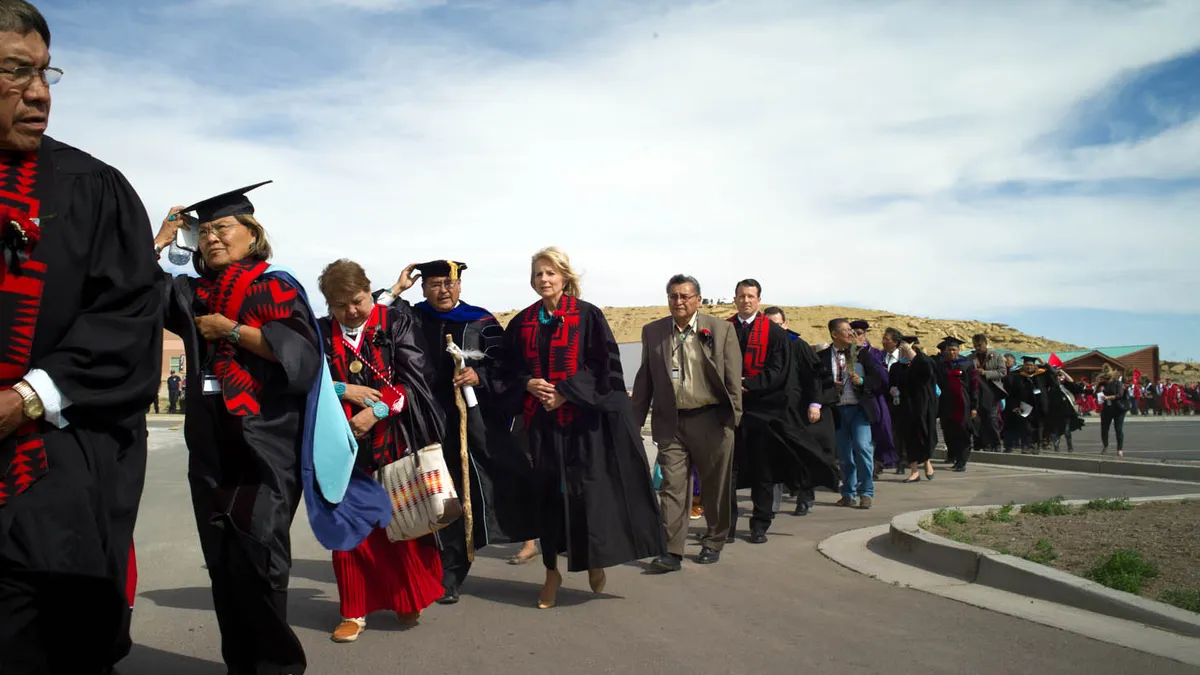Dive Brief:
- Alumni of tribal colleges and universities (TCUs) are more likely to feel prepared for life after college and to be engaged in their jobs than are other graduates, according to the results of a new survey from Gallup and the American Indian College Fund.
- The survey compared the responses of nearly 600 TCU alumni to responses from college graduates nationally, self-identified American Indian and Alaska Native graduates, and alumni of minority-serving institutions (MSIs).
- The study "affirms the value" of TCUs, the report's authors write, noting that its results could help secure more support for such schools, which experience "chronic underfunding."
Dive Insight:
For more than 50 years, TCUs have provided a way for students to attend a postsecondary institution on or near reservations. About 11% of Native students at two- and four-year colleges in the U.S. attend a TCU, which are mostly concentrated along the U.S.-Canadian border and in the Southwest.
TCU alumni tend to have more financial need because they are "overwhelmingly first-generation" students, the report notes. For example, 81% of TCU graduates received need-based federal financial aid, compared to 56% of graduates nationally and 60% of students at MSIs.
Unlike other public colleges, TCUs draw most of their funding from the federal government and have limited ability to raise tuition and fees. In recent years, federal allocations haven't kept up with enrollment at such colleges, according to a 2016 report from the American Council on Education.
Even so, the Gallup survey reveals that those students tend to have "positive college experiences" across several metrics.
For one, 67% of TCU alumni strongly agreed that their institution was worth the cost, compared to 39% of U.S. college graduates and 42% of MSI graduates, as well as American Indian or Alaska Native graduates. And TCU graduates reported higher rates of being engaged in their full-time jobs and thriving in their social lives when compared to students nationally.
"Tribal colleges and community colleges, in general, are kind of overlooked as the younger brothers of mainstream institutions," said David Sanders, vice president of research, evaluation and faculty development at The College Fund. "When you look at the graduate outcomes, it really points to these institutions as leading the way in serving students from disadvantaged backgrounds."
Moreover, nearly half of TCU alumni indicated they are emotionally attached to their alma maters, compared to around one-fifth across all other categories of students surveyed.
Their positive views may be linked with the emotional support they received during college.
Two in five TCU alumni said they had a mentor who encouraged them to pursue their goals, professors who cared about them and at least one instructor who excited them about learning. That's compared to fewer than one in five of college graduates nationally who said the same.
"Oftentimes faculty are overlooked in the success of students, but the alumni really pointed them out as the individuals who pointed them towards opportunities," Sanders said.
TCUs also benefit from their strong relationships with American Indian communities, said Shane Pruitt, an education research subject matter expert at Gallup.
"They're aligned, not just in place but also (with their curriculum), to what those communities are offering when it comes to jobs," he said. Indeed, nearly three-fourths (74%) of TCU graduates end up working in jobs involving American Indian communities or tribal lands.
The report's results may help TCUs recruit students, Sanders said. "There are real positive benefits to attending tribal colleges," he added. "The education is of great value not only to them but to their communities."











